Are you curious about whether wasabi can kill bacteria?
Wasabi, a popular condiment with a unique flavor, has potentially been found to possess antibacterial properties. Native to Japan and commonly used in Japanese cuisine, this plant contains compounds called isothiocyanates, giving it a distinctive taste and potential health benefits.
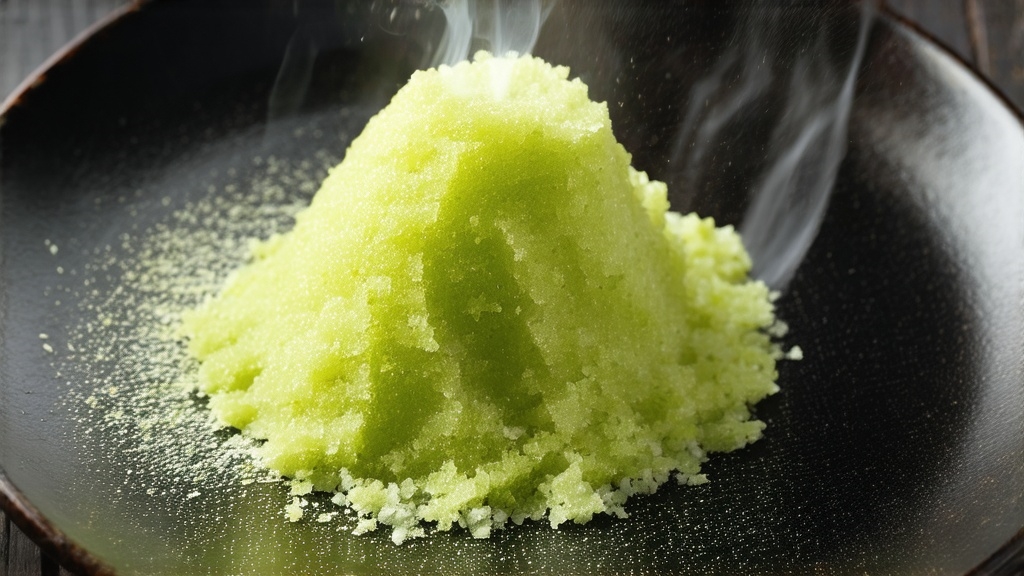

While some research suggests promising results, more studies are needed to understand its effectiveness and answer the question fully, ‘Does wasabi kill bacteria?’
So, let’s dive into the science behind wasabi’s antibacterial properties and explore its real-life applications for bacteria control.
Key Takeaways
- Wasabi contains isothiocyanate, which inhibits the growth of pathogenic bacteria such as Salmonella and Streptococcus mutans.
- Wasabi extract shows anti-cancer properties in stomach cancer cells.
- Wasabi has antibacterial property against foodborne pathogens, slowing down the growth rate of bacteria like E. Coli and H. Pylori, reducing the risk of food poisoning.
What is Wasabi?
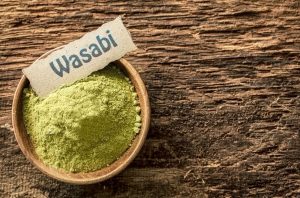
Picture yourself in a sushi restaurant, eagerly waiting for that delightful plate of sushi to arrive. As the chef prepares the dish, you notice a vibrant green condiment on the side, ready to awaken your taste buds. That, my friend, is wasabi, a fascinating and flavorful addition to Japanese cuisine.
Wasabi, the Flavorful Enigma
Wasabi, scientifically known as Wasabia japonica, is a green, pungent condiment native to Japan. It’s derived from the root of the wasabi plant, which is a member of the Brassicaceae family, closely related to cabbage, mustard, and horseradish. What sets wasabi apart is its distinctive flavor – a spicy, sinus-clearing kick that can make your eyes water and your nose tingle.
The Quest for Authenticity
Authentic wasabi is a culinary rarity. Why? Because cultivating this precious plant is a challenge. It demands specific conditions – cool, flowing water and rich soil – found in only a few regions of Japan. That’s why, in most cases, what’s passed off as “wasabi” in your sushi joint is actually a mixture of horseradish, mustard, and green food coloring. So, if you’ve ever wondered why that green paste tastes more pungent than usual, you’ve likely experienced the horseradish impersonator.
Wasabi’s Role in Japanese Cuisine
In Japanese cuisine, wasabi plays a pivotal role. Its fiery flavor adds depth to sushi and serves as a natural preservative, protecting against potential bacterial contamination in raw fish. It’s customary to enjoy sushi by applying a dab of wasabi between the rice and fish, creating a harmonious symphony of flavors.
Now that you’re acquainted with the essence of wasabi, let’s dive deeper into its potential health benefits.
The Science of Wasabi’s Antibacterial Properties
Wasabi contains compounds called isothiocyanate, responsible for its potential antibacterial properties. These compounds have been the subject of scientific research to understand their effects on bacteria. Studies have shown that isothiocyanates found in wasabi can inhibit the growth of certain bacteria, including Salmonella and Streptococcus mutans.
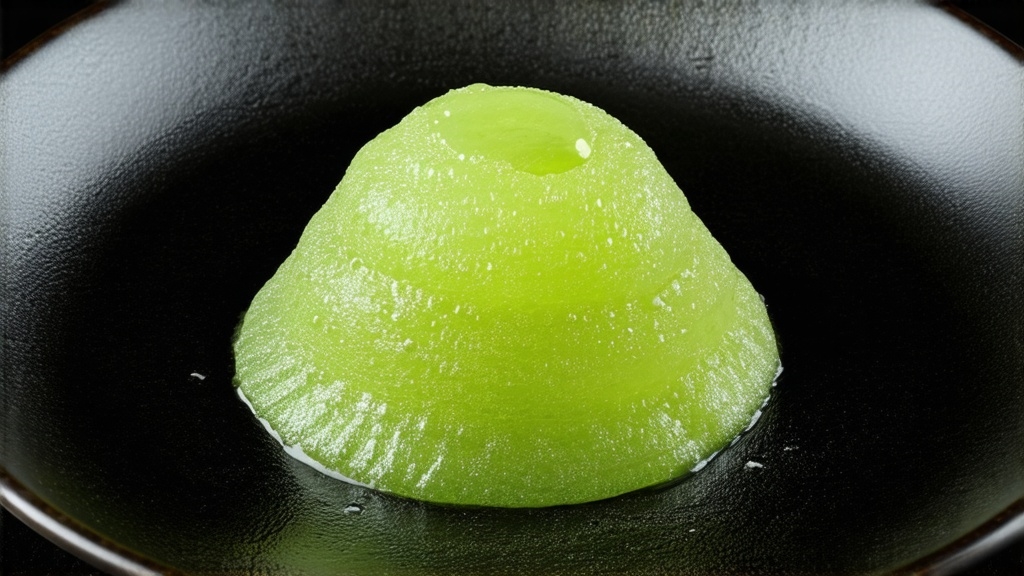

The mechanism behind this antibacterial action lies in the ability of isothiocyanates to interfere with bacterial cell growth. They target specific enzymes and proteins involved in bacterial replication, preventing them from functioning properly. As a result, the bacteria’s ability to multiply and spread is slowed down.
It’s important to note that while wasabi has demonstrated antibacterial potential, it cannot kill parasites or bacteria completely. Instead, it slows their growth rate, reducing the risk of food poisoning caused by bacterial contamination. This makes people feel safer when consuming sushi or other dishes where raw fish may be present.
Real-Life Food Applications of Wasabi in Bacteria Control
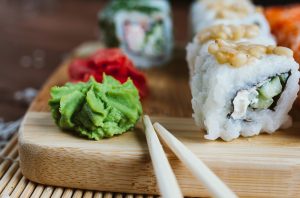
Adding real wasabi to sushi and other raw fish dishes can help inhibit the growth of bacteria, providing an additional layer of safety against foodborne illnesses. The antimicrobial properties of authentic wasabi have been studied, showing the potential to reduce bacterial growth. While it does not completely kill bacteria, it slows their multiplication rate.
Wasabi may have some antibacterial effects, but it cannot protect you from bacteria in raw fish. It can only slow down some bacteria, not eliminate them all. To avoid food poisoning, you need to make sure the fish is fresh, refrigerated, and handled properly. Wasabi is mainly for adding flavor, not for ensuring food safety.
Debunking Myths: Does Wasabi Kill Bacteria
Don’t confuse wasabi’s kick with a germ-killing superpower! While it has some antibacterial properties, wasabi alone can’t guarantee safety from bacteria in raw fish. It might slow down some bacterial growth, but it’s not strong enough to eliminate them all. Remember, proper handling, refrigeration, and choosing fresh fish are key for food safety. Enjoy wasabi for its flavor, not as a substitute for safe food practices.
Potential Health Benefits of Wasabi
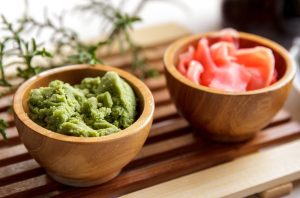
Wasabi isn’t only a fighter against bacteria but may offer other intriguing health benefits. Beyond tantalizing your taste buds, it could do wonders for your well-being. Let’s explore the potential health perks hidden within that fiery green paste.
1. Cancer-Fighting Potential
Research has hinted at wasabi’s anti-cancer properties, particularly in relation to stomach cancer cells. The isothiocyanates in wasabi have demonstrated their ability to thwart the growth of cancer cells in laboratory settings. While this doesn’t mean you should swap out your doctor’s advice for a daily wasabi regimen, it does shed light on the potential of this fiery condiment in the world of cancer research.
2. Digestive Aid
Wasabi can also be a friend to your digestive system. It possesses enzymes that aid in the digestion of proteins, potentially easing post-meal discomfort. So, if you find yourself reaching for more wasabi during your sushi feast, your digestive system might just be thanking you.



Konnichiwa! (Hello!) I'm Pat Tokuyama, a Japanese tofu cookbook author, who travels for music, food, and adventure. If you like Japanese tea, checkout some of the newestorganic japanese tea, matcha bowls and noren and more!
** Curious about the Plant Based Japanese Cooking Club? ** Learn more here!
3. Anti-inflammatory and Antioxidant Powerhouse
Additionally, wasabi boasts anti-inflammatory properties that may help reduce inflammation in the body. It’s also rich in antioxidants, which can combat oxidative stress and support overall health. While it’s no substitute for a balanced diet, these qualities make wasabi a potentially welcome addition to your culinary arsenal.
Precautions and Considerations When Using Wasabi for Bacteria Control
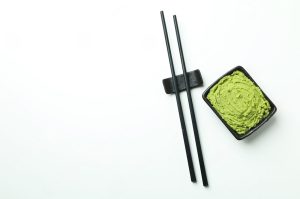
Consuming excessive wasabi may result in adverse reactions, so enjoying it in moderation is important. When using wasabi for bacteria control, there are a few precautions and considerations that you should keep in mind.
- Allergies: Some individuals may have allergies or sensitivities to wasabi. It’s important to be aware of any allergic reactions you might have before consuming it. If you experience itching, swelling, or difficulty breathing after eating wasabi, seek medical attention immediately.
- Authenticity: Real wasabi is difficult to cultivate and can be quite expensive. As a result, many products on the market labeled as ‘wasabi’ are actually made from horseradish with added ingredients and green dye. These imitations may not have the same antibacterial properties as authentic wasabi. To ensure you’re getting the real deal, look for products that specify they contain genuine wasabi.
- Hygiene: While wasabi has been shown to inhibit bacterial growth, it should not be relied upon as the sole method of preventing foodborne illnesses. Proper hygiene practices during food preparation are crucial for maintaining food safety. Make sure your sushi is prepared in a clean environment by trained professionals who follow strict sanitation guidelines.


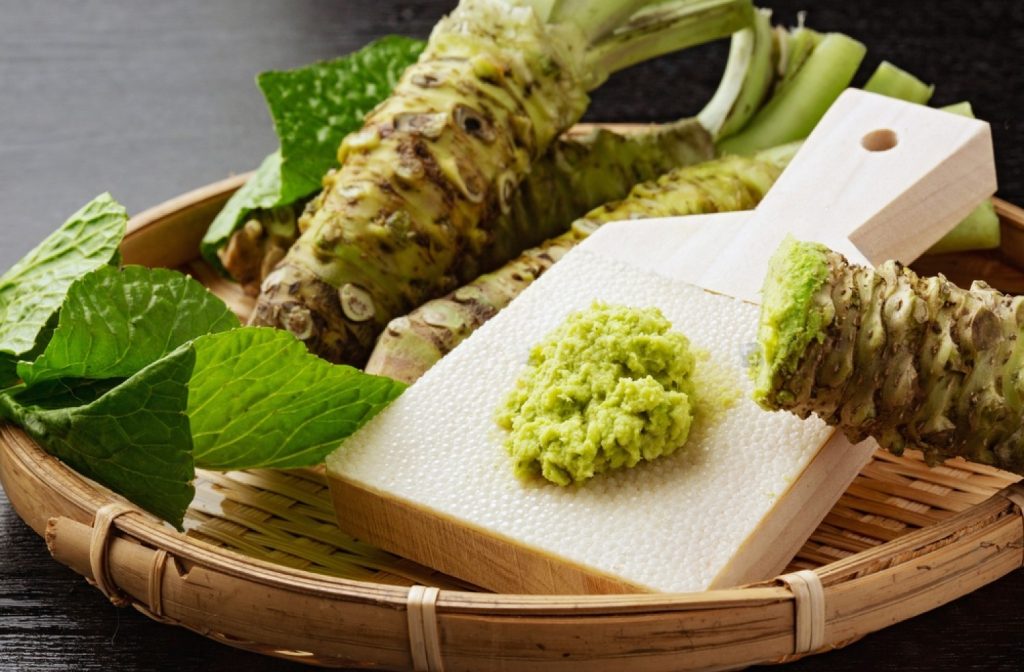






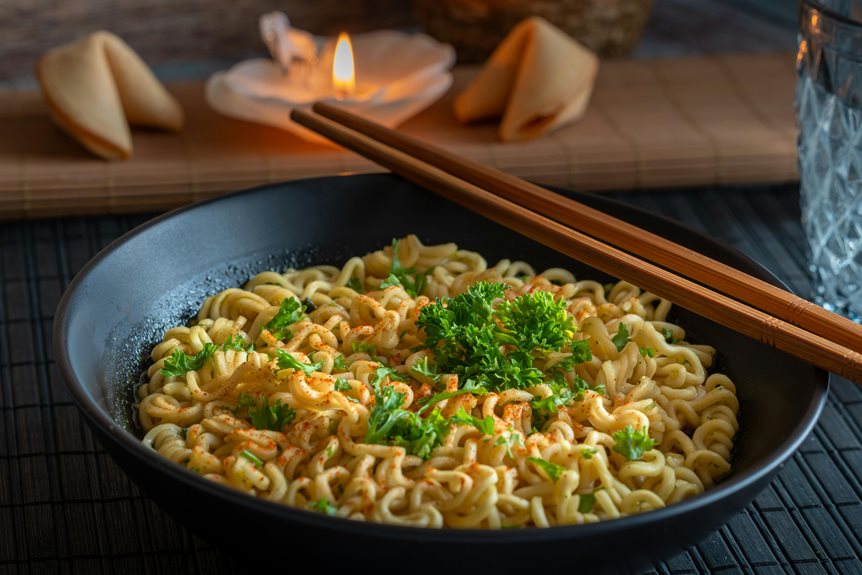

Konnichiwa! (Hello!) I'm Pat Tokuyama, a Japanese tofu cookbook author, who travels for music, food, and adventure. If you like Japanese tea, checkout some of the newestorganic japanese tea, matcha bowls and noren and more!
** Curious about the Plant Based Japanese Cooking Club? ** Learn more here!